Organisational Behaviour and Leadership: BBC Company Case Study Report
VerifiedAdded on 2020/07/22
|17
|5535
|65
Report
AI Summary
This report provides an in-depth analysis of organisational behaviour within the BBC, focusing on the influence of politics, power, and culture on individual and team dynamics. It examines the failures in BBC's communication, management, and investigation systems, highlighting issues such as bullying and harassment. The report explores various motivational theories, including extrinsic and intrinsic approaches, content theories like Maslow's Hierarchy and Herzberg's Two-Factor theory, and Alderfer's ERG theory, to understand how to motivate employees for achieving goals. Furthermore, it discusses the impact of globalisation and digital technology on organisational culture, along with the application of network and systems theory to understand organisational structures and behaviours. The report uses the BBC case study to illustrate how these concepts apply in a real-world context, including the importance of a positive work environment and effective communication for fostering employee engagement and achieving organisational objectives. Finally, the report discusses the importance of cooperation and collaboration within an organization.
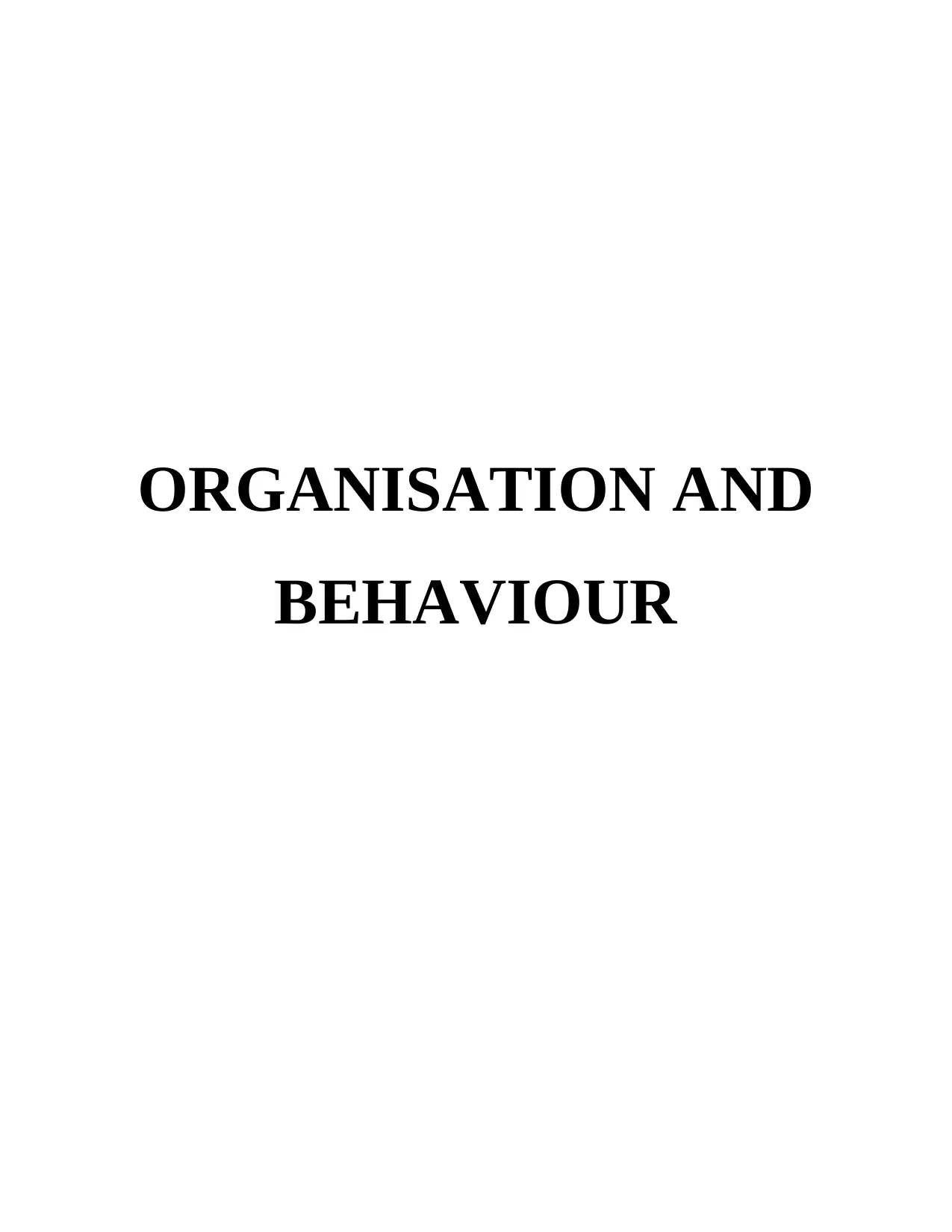
ORGANISATION AND
BEHAVIOUR
BEHAVIOUR
Paraphrase This Document
Need a fresh take? Get an instant paraphrase of this document with our AI Paraphraser
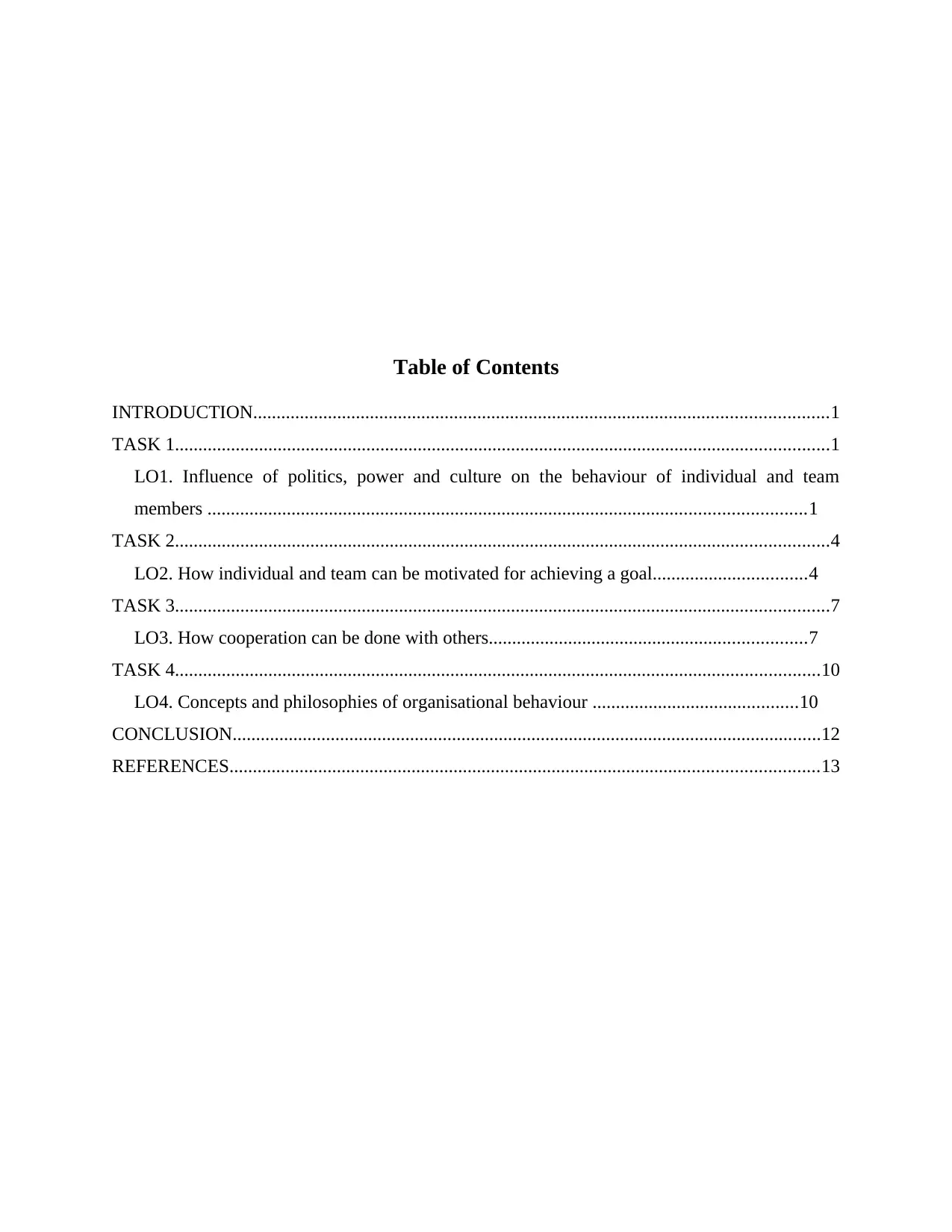
Table of Contents
INTRODUCTION...........................................................................................................................1
TASK 1............................................................................................................................................1
LO1. Influence of politics, power and culture on the behaviour of individual and team
members ................................................................................................................................1
TASK 2............................................................................................................................................4
LO2. How individual and team can be motivated for achieving a goal.................................4
TASK 3............................................................................................................................................7
LO3. How cooperation can be done with others....................................................................7
TASK 4..........................................................................................................................................10
LO4. Concepts and philosophies of organisational behaviour ............................................10
CONCLUSION..............................................................................................................................12
REFERENCES..............................................................................................................................13
INTRODUCTION...........................................................................................................................1
TASK 1............................................................................................................................................1
LO1. Influence of politics, power and culture on the behaviour of individual and team
members ................................................................................................................................1
TASK 2............................................................................................................................................4
LO2. How individual and team can be motivated for achieving a goal.................................4
TASK 3............................................................................................................................................7
LO3. How cooperation can be done with others....................................................................7
TASK 4..........................................................................................................................................10
LO4. Concepts and philosophies of organisational behaviour ............................................10
CONCLUSION..............................................................................................................................12
REFERENCES..............................................................................................................................13
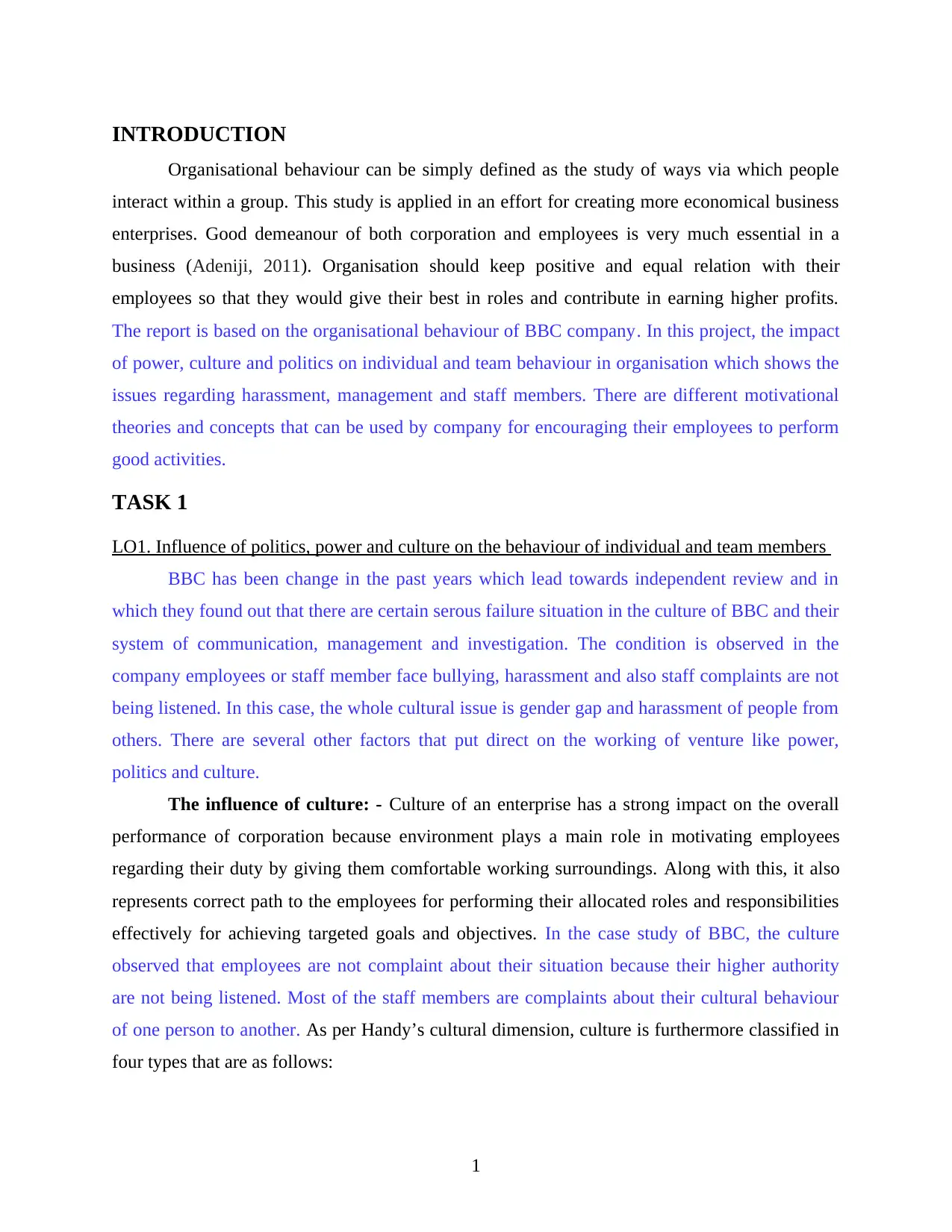
INTRODUCTION
Organisational behaviour can be simply defined as the study of ways via which people
interact within a group. This study is applied in an effort for creating more economical business
enterprises. Good demeanour of both corporation and employees is very much essential in a
business (Adeniji, 2011). Organisation should keep positive and equal relation with their
employees so that they would give their best in roles and contribute in earning higher profits.
The report is based on the organisational behaviour of BBC company. In this project, the impact
of power, culture and politics on individual and team behaviour in organisation which shows the
issues regarding harassment, management and staff members. There are different motivational
theories and concepts that can be used by company for encouraging their employees to perform
good activities.
TASK 1
LO1. Influence of politics, power and culture on the behaviour of individual and team members
BBC has been change in the past years which lead towards independent review and in
which they found out that there are certain serous failure situation in the culture of BBC and their
system of communication, management and investigation. The condition is observed in the
company employees or staff member face bullying, harassment and also staff complaints are not
being listened. In this case, the whole cultural issue is gender gap and harassment of people from
others. There are several other factors that put direct on the working of venture like power,
politics and culture.
The influence of culture: - Culture of an enterprise has a strong impact on the overall
performance of corporation because environment plays a main role in motivating employees
regarding their duty by giving them comfortable working surroundings. Along with this, it also
represents correct path to the employees for performing their allocated roles and responsibilities
effectively for achieving targeted goals and objectives. In the case study of BBC, the culture
observed that employees are not complaint about their situation because their higher authority
are not being listened. Most of the staff members are complaints about their cultural behaviour
of one person to another. As per Handy’s cultural dimension, culture is furthermore classified in
four types that are as follows:
1
Organisational behaviour can be simply defined as the study of ways via which people
interact within a group. This study is applied in an effort for creating more economical business
enterprises. Good demeanour of both corporation and employees is very much essential in a
business (Adeniji, 2011). Organisation should keep positive and equal relation with their
employees so that they would give their best in roles and contribute in earning higher profits.
The report is based on the organisational behaviour of BBC company. In this project, the impact
of power, culture and politics on individual and team behaviour in organisation which shows the
issues regarding harassment, management and staff members. There are different motivational
theories and concepts that can be used by company for encouraging their employees to perform
good activities.
TASK 1
LO1. Influence of politics, power and culture on the behaviour of individual and team members
BBC has been change in the past years which lead towards independent review and in
which they found out that there are certain serous failure situation in the culture of BBC and their
system of communication, management and investigation. The condition is observed in the
company employees or staff member face bullying, harassment and also staff complaints are not
being listened. In this case, the whole cultural issue is gender gap and harassment of people from
others. There are several other factors that put direct on the working of venture like power,
politics and culture.
The influence of culture: - Culture of an enterprise has a strong impact on the overall
performance of corporation because environment plays a main role in motivating employees
regarding their duty by giving them comfortable working surroundings. Along with this, it also
represents correct path to the employees for performing their allocated roles and responsibilities
effectively for achieving targeted goals and objectives. In the case study of BBC, the culture
observed that employees are not complaint about their situation because their higher authority
are not being listened. Most of the staff members are complaints about their cultural behaviour
of one person to another. As per Handy’s cultural dimension, culture is furthermore classified in
four types that are as follows:
1
⊘ This is a preview!⊘
Do you want full access?
Subscribe today to unlock all pages.

Trusted by 1+ million students worldwide
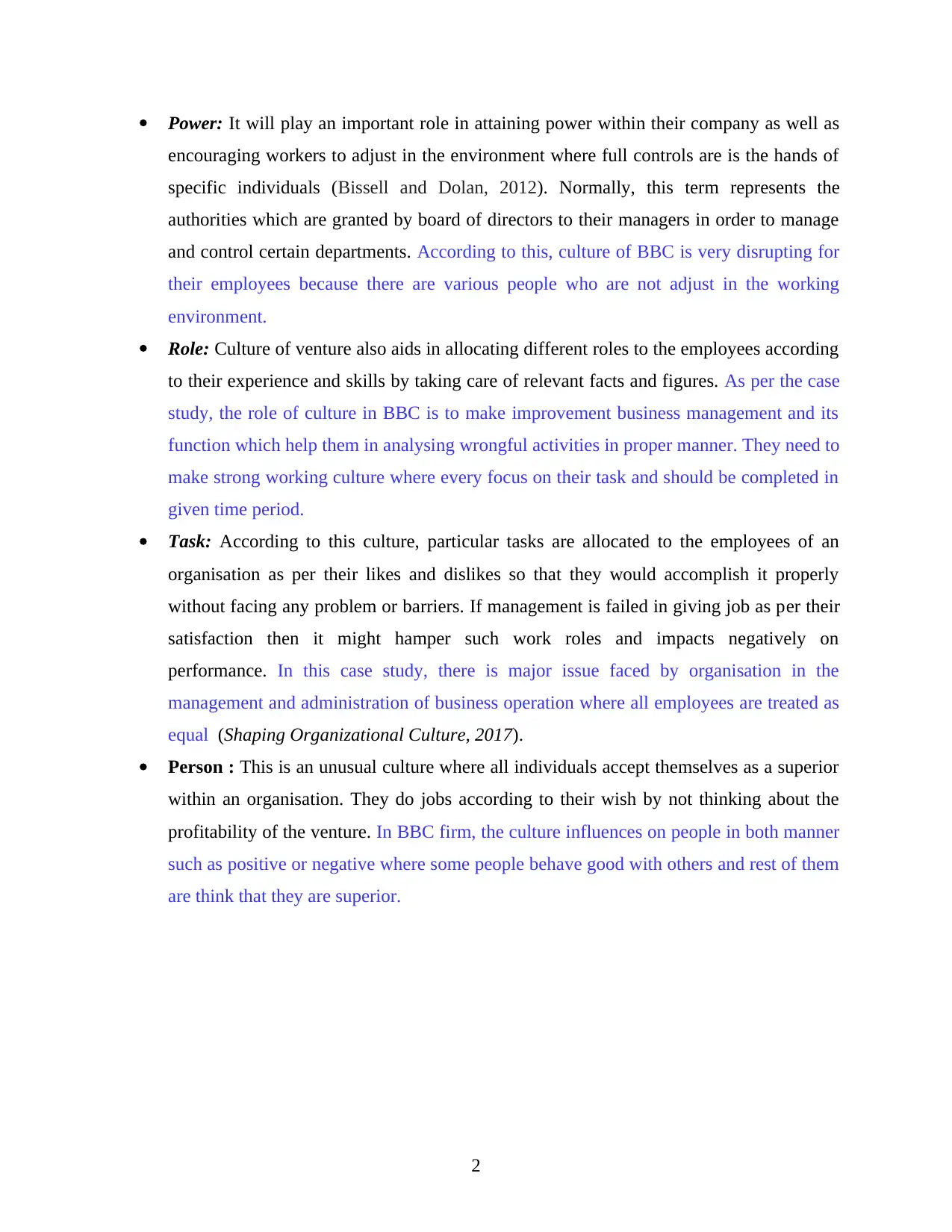
Power: It will play an important role in attaining power within their company as well as
encouraging workers to adjust in the environment where full controls are is the hands of
specific individuals (Bissell and Dolan, 2012). Normally, this term represents the
authorities which are granted by board of directors to their managers in order to manage
and control certain departments. According to this, culture of BBC is very disrupting for
their employees because there are various people who are not adjust in the working
environment.
Role: Culture of venture also aids in allocating different roles to the employees according
to their experience and skills by taking care of relevant facts and figures. As per the case
study, the role of culture in BBC is to make improvement business management and its
function which help them in analysing wrongful activities in proper manner. They need to
make strong working culture where every focus on their task and should be completed in
given time period.
Task: According to this culture, particular tasks are allocated to the employees of an
organisation as per their likes and dislikes so that they would accomplish it properly
without facing any problem or barriers. If management is failed in giving job as per their
satisfaction then it might hamper such work roles and impacts negatively on
performance. In this case study, there is major issue faced by organisation in the
management and administration of business operation where all employees are treated as
equal (Shaping Organizational Culture, 2017).
Person : This is an unusual culture where all individuals accept themselves as a superior
within an organisation. They do jobs according to their wish by not thinking about the
profitability of the venture. In BBC firm, the culture influences on people in both manner
such as positive or negative where some people behave good with others and rest of them
are think that they are superior.
2
encouraging workers to adjust in the environment where full controls are is the hands of
specific individuals (Bissell and Dolan, 2012). Normally, this term represents the
authorities which are granted by board of directors to their managers in order to manage
and control certain departments. According to this, culture of BBC is very disrupting for
their employees because there are various people who are not adjust in the working
environment.
Role: Culture of venture also aids in allocating different roles to the employees according
to their experience and skills by taking care of relevant facts and figures. As per the case
study, the role of culture in BBC is to make improvement business management and its
function which help them in analysing wrongful activities in proper manner. They need to
make strong working culture where every focus on their task and should be completed in
given time period.
Task: According to this culture, particular tasks are allocated to the employees of an
organisation as per their likes and dislikes so that they would accomplish it properly
without facing any problem or barriers. If management is failed in giving job as per their
satisfaction then it might hamper such work roles and impacts negatively on
performance. In this case study, there is major issue faced by organisation in the
management and administration of business operation where all employees are treated as
equal (Shaping Organizational Culture, 2017).
Person : This is an unusual culture where all individuals accept themselves as a superior
within an organisation. They do jobs according to their wish by not thinking about the
profitability of the venture. In BBC firm, the culture influences on people in both manner
such as positive or negative where some people behave good with others and rest of them
are think that they are superior.
2
Paraphrase This Document
Need a fresh take? Get an instant paraphrase of this document with our AI Paraphraser
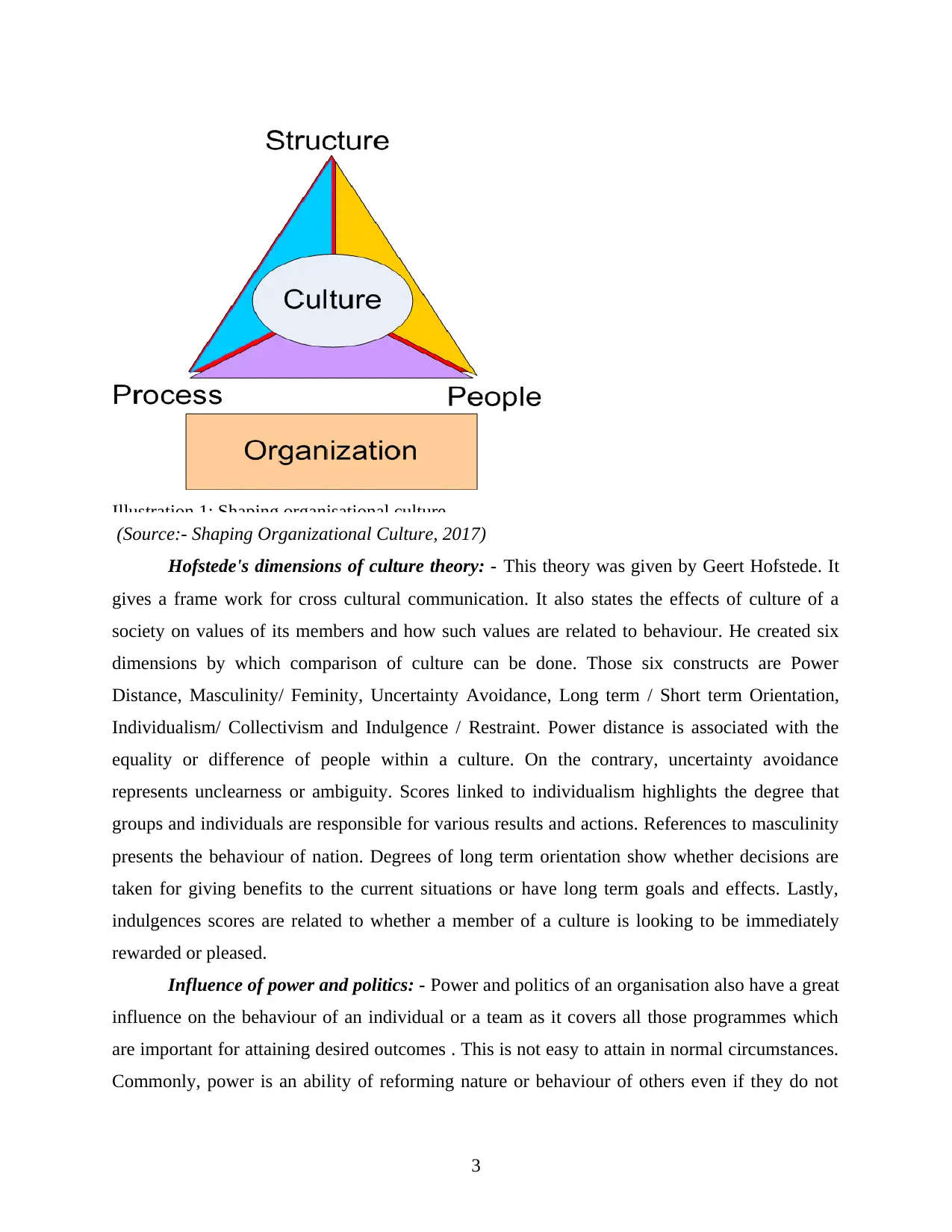
Illustration 1: Shaping organisational culture
(Source:- Shaping Organizational Culture, 2017)
Hofstede's dimensions of culture theory: - This theory was given by Geert Hofstede. It
gives a frame work for cross cultural communication. It also states the effects of culture of a
society on values of its members and how such values are related to behaviour. He created six
dimensions by which comparison of culture can be done. Those six constructs are Power
Distance, Masculinity/ Feminity, Uncertainty Avoidance, Long term / Short term Orientation,
Individualism/ Collectivism and Indulgence / Restraint. Power distance is associated with the
equality or difference of people within a culture. On the contrary, uncertainty avoidance
represents unclearness or ambiguity. Scores linked to individualism highlights the degree that
groups and individuals are responsible for various results and actions. References to masculinity
presents the behaviour of nation. Degrees of long term orientation show whether decisions are
taken for giving benefits to the current situations or have long term goals and effects. Lastly,
indulgences scores are related to whether a member of a culture is looking to be immediately
rewarded or pleased.
Influence of power and politics: - Power and politics of an organisation also have a great
influence on the behaviour of an individual or a team as it covers all those programmes which
are important for attaining desired outcomes . This is not easy to attain in normal circumstances.
Commonly, power is an ability of reforming nature or behaviour of others even if they do not
3
(Source:- Shaping Organizational Culture, 2017)
Hofstede's dimensions of culture theory: - This theory was given by Geert Hofstede. It
gives a frame work for cross cultural communication. It also states the effects of culture of a
society on values of its members and how such values are related to behaviour. He created six
dimensions by which comparison of culture can be done. Those six constructs are Power
Distance, Masculinity/ Feminity, Uncertainty Avoidance, Long term / Short term Orientation,
Individualism/ Collectivism and Indulgence / Restraint. Power distance is associated with the
equality or difference of people within a culture. On the contrary, uncertainty avoidance
represents unclearness or ambiguity. Scores linked to individualism highlights the degree that
groups and individuals are responsible for various results and actions. References to masculinity
presents the behaviour of nation. Degrees of long term orientation show whether decisions are
taken for giving benefits to the current situations or have long term goals and effects. Lastly,
indulgences scores are related to whether a member of a culture is looking to be immediately
rewarded or pleased.
Influence of power and politics: - Power and politics of an organisation also have a great
influence on the behaviour of an individual or a team as it covers all those programmes which
are important for attaining desired outcomes . This is not easy to attain in normal circumstances.
Commonly, power is an ability of reforming nature or behaviour of others even if they do not
3
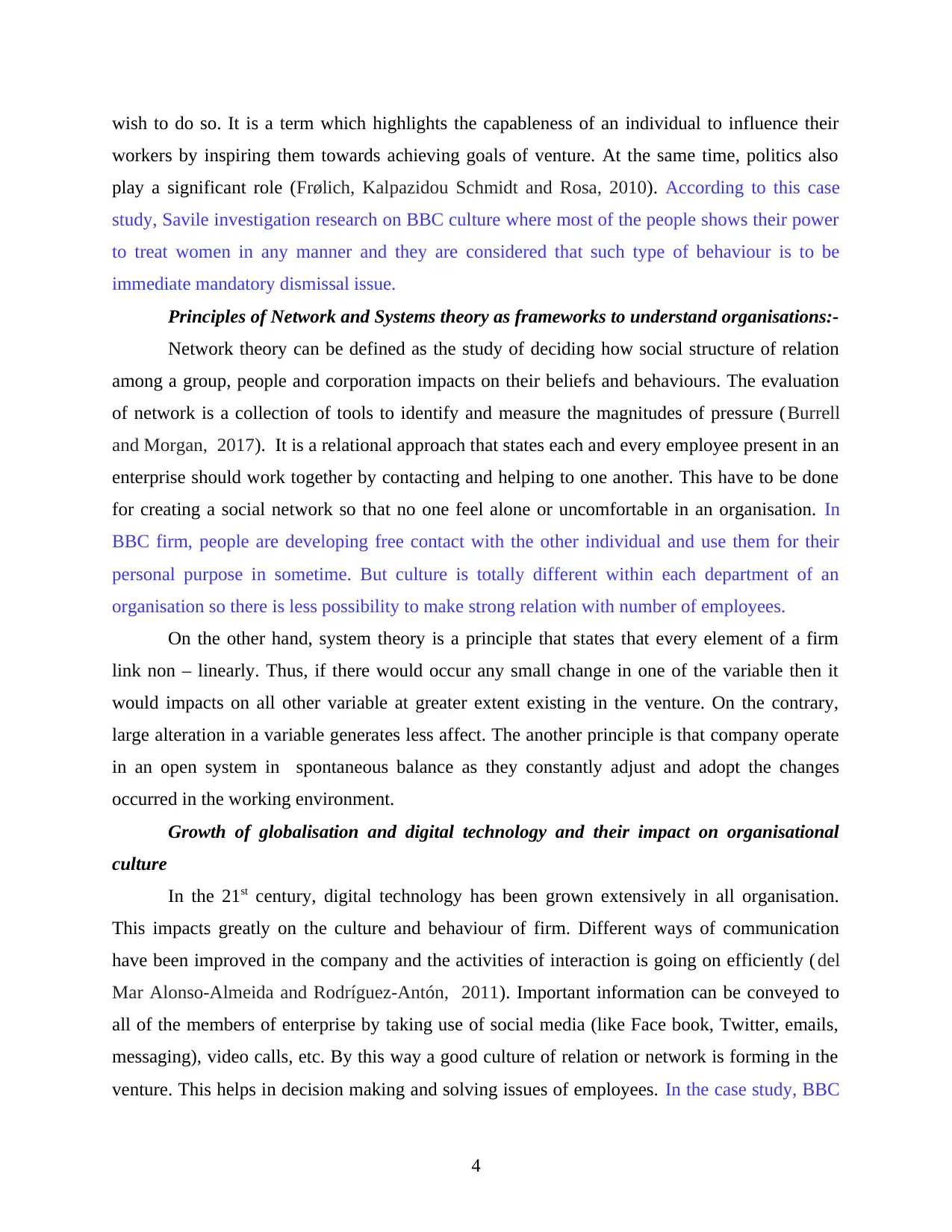
wish to do so. It is a term which highlights the capableness of an individual to influence their
workers by inspiring them towards achieving goals of venture. At the same time, politics also
play a significant role (Frølich, Kalpazidou Schmidt and Rosa, 2010). According to this case
study, Savile investigation research on BBC culture where most of the people shows their power
to treat women in any manner and they are considered that such type of behaviour is to be
immediate mandatory dismissal issue.
Principles of Network and Systems theory as frameworks to understand organisations:-
Network theory can be defined as the study of deciding how social structure of relation
among a group, people and corporation impacts on their beliefs and behaviours. The evaluation
of network is a collection of tools to identify and measure the magnitudes of pressure (Burrell
and Morgan, 2017). It is a relational approach that states each and every employee present in an
enterprise should work together by contacting and helping to one another. This have to be done
for creating a social network so that no one feel alone or uncomfortable in an organisation. In
BBC firm, people are developing free contact with the other individual and use them for their
personal purpose in sometime. But culture is totally different within each department of an
organisation so there is less possibility to make strong relation with number of employees.
On the other hand, system theory is a principle that states that every element of a firm
link non – linearly. Thus, if there would occur any small change in one of the variable then it
would impacts on all other variable at greater extent existing in the venture. On the contrary,
large alteration in a variable generates less affect. The another principle is that company operate
in an open system in spontaneous balance as they constantly adjust and adopt the changes
occurred in the working environment.
Growth of globalisation and digital technology and their impact on organisational
culture
In the 21st century, digital technology has been grown extensively in all organisation.
This impacts greatly on the culture and behaviour of firm. Different ways of communication
have been improved in the company and the activities of interaction is going on efficiently ( del
Mar Alonso-Almeida and Rodríguez-Antón, 2011). Important information can be conveyed to
all of the members of enterprise by taking use of social media (like Face book, Twitter, emails,
messaging), video calls, etc. By this way a good culture of relation or network is forming in the
venture. This helps in decision making and solving issues of employees. In the case study, BBC
4
workers by inspiring them towards achieving goals of venture. At the same time, politics also
play a significant role (Frølich, Kalpazidou Schmidt and Rosa, 2010). According to this case
study, Savile investigation research on BBC culture where most of the people shows their power
to treat women in any manner and they are considered that such type of behaviour is to be
immediate mandatory dismissal issue.
Principles of Network and Systems theory as frameworks to understand organisations:-
Network theory can be defined as the study of deciding how social structure of relation
among a group, people and corporation impacts on their beliefs and behaviours. The evaluation
of network is a collection of tools to identify and measure the magnitudes of pressure (Burrell
and Morgan, 2017). It is a relational approach that states each and every employee present in an
enterprise should work together by contacting and helping to one another. This have to be done
for creating a social network so that no one feel alone or uncomfortable in an organisation. In
BBC firm, people are developing free contact with the other individual and use them for their
personal purpose in sometime. But culture is totally different within each department of an
organisation so there is less possibility to make strong relation with number of employees.
On the other hand, system theory is a principle that states that every element of a firm
link non – linearly. Thus, if there would occur any small change in one of the variable then it
would impacts on all other variable at greater extent existing in the venture. On the contrary,
large alteration in a variable generates less affect. The another principle is that company operate
in an open system in spontaneous balance as they constantly adjust and adopt the changes
occurred in the working environment.
Growth of globalisation and digital technology and their impact on organisational
culture
In the 21st century, digital technology has been grown extensively in all organisation.
This impacts greatly on the culture and behaviour of firm. Different ways of communication
have been improved in the company and the activities of interaction is going on efficiently ( del
Mar Alonso-Almeida and Rodríguez-Antón, 2011). Important information can be conveyed to
all of the members of enterprise by taking use of social media (like Face book, Twitter, emails,
messaging), video calls, etc. By this way a good culture of relation or network is forming in the
venture. This helps in decision making and solving issues of employees. In the case study, BBC
4
⊘ This is a preview!⊘
Do you want full access?
Subscribe today to unlock all pages.

Trusted by 1+ million students worldwide
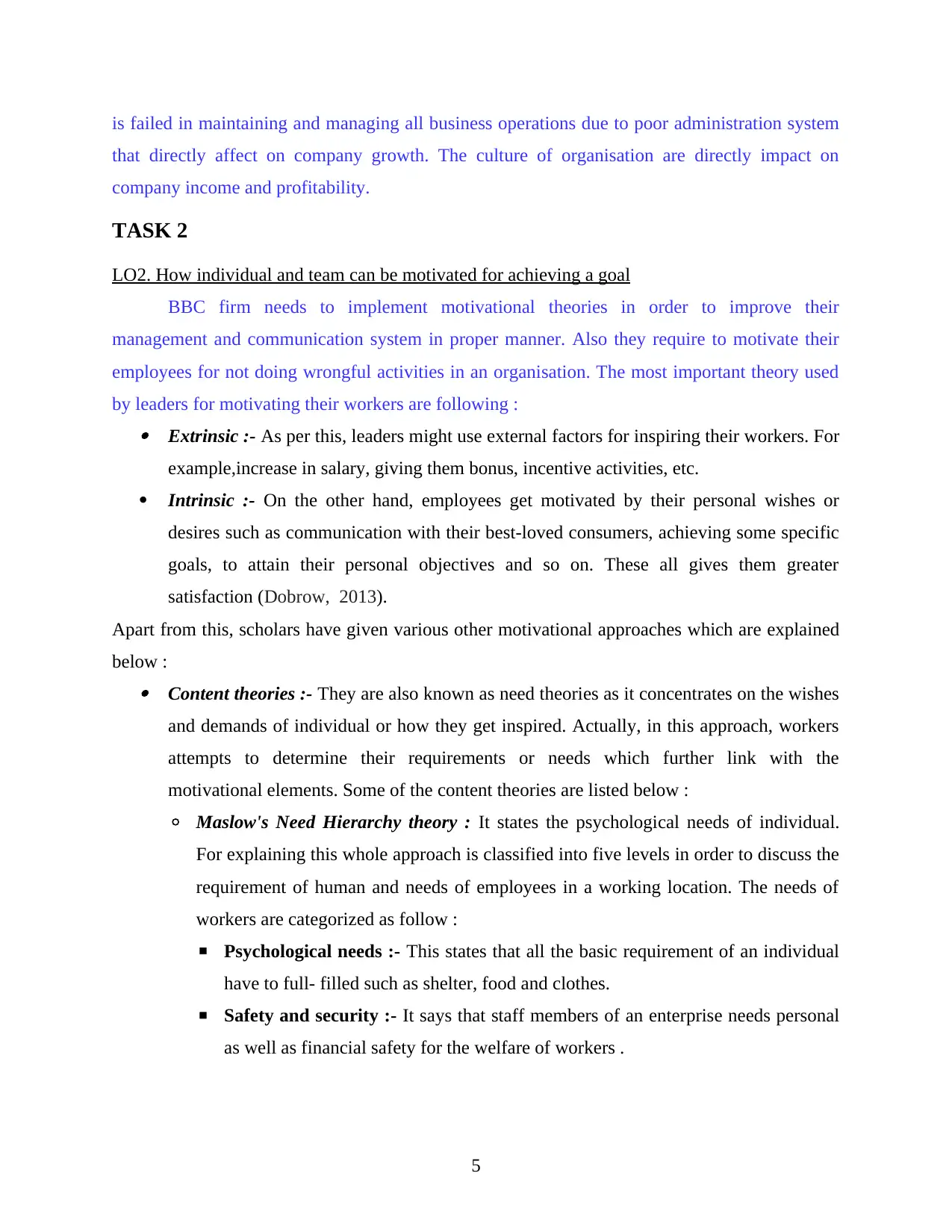
is failed in maintaining and managing all business operations due to poor administration system
that directly affect on company growth. The culture of organisation are directly impact on
company income and profitability.
TASK 2
LO2. How individual and team can be motivated for achieving a goal
BBC firm needs to implement motivational theories in order to improve their
management and communication system in proper manner. Also they require to motivate their
employees for not doing wrongful activities in an organisation. The most important theory used
by leaders for motivating their workers are following : Extrinsic :- As per this, leaders might use external factors for inspiring their workers. For
example,increase in salary, giving them bonus, incentive activities, etc.
Intrinsic :- On the other hand, employees get motivated by their personal wishes or
desires such as communication with their best-loved consumers, achieving some specific
goals, to attain their personal objectives and so on. These all gives them greater
satisfaction (Dobrow, 2013).
Apart from this, scholars have given various other motivational approaches which are explained
below : Content theories :- They are also known as need theories as it concentrates on the wishes
and demands of individual or how they get inspired. Actually, in this approach, workers
attempts to determine their requirements or needs which further link with the
motivational elements. Some of the content theories are listed below :
◦ Maslow's Need Hierarchy theory : It states the psychological needs of individual.
For explaining this whole approach is classified into five levels in order to discuss the
requirement of human and needs of employees in a working location. The needs of
workers are categorized as follow :
▪ Psychological needs :- This states that all the basic requirement of an individual
have to full- filled such as shelter, food and clothes.
▪ Safety and security :- It says that staff members of an enterprise needs personal
as well as financial safety for the welfare of workers .
5
that directly affect on company growth. The culture of organisation are directly impact on
company income and profitability.
TASK 2
LO2. How individual and team can be motivated for achieving a goal
BBC firm needs to implement motivational theories in order to improve their
management and communication system in proper manner. Also they require to motivate their
employees for not doing wrongful activities in an organisation. The most important theory used
by leaders for motivating their workers are following : Extrinsic :- As per this, leaders might use external factors for inspiring their workers. For
example,increase in salary, giving them bonus, incentive activities, etc.
Intrinsic :- On the other hand, employees get motivated by their personal wishes or
desires such as communication with their best-loved consumers, achieving some specific
goals, to attain their personal objectives and so on. These all gives them greater
satisfaction (Dobrow, 2013).
Apart from this, scholars have given various other motivational approaches which are explained
below : Content theories :- They are also known as need theories as it concentrates on the wishes
and demands of individual or how they get inspired. Actually, in this approach, workers
attempts to determine their requirements or needs which further link with the
motivational elements. Some of the content theories are listed below :
◦ Maslow's Need Hierarchy theory : It states the psychological needs of individual.
For explaining this whole approach is classified into five levels in order to discuss the
requirement of human and needs of employees in a working location. The needs of
workers are categorized as follow :
▪ Psychological needs :- This states that all the basic requirement of an individual
have to full- filled such as shelter, food and clothes.
▪ Safety and security :- It says that staff members of an enterprise needs personal
as well as financial safety for the welfare of workers .
5
Paraphrase This Document
Need a fresh take? Get an instant paraphrase of this document with our AI Paraphraser
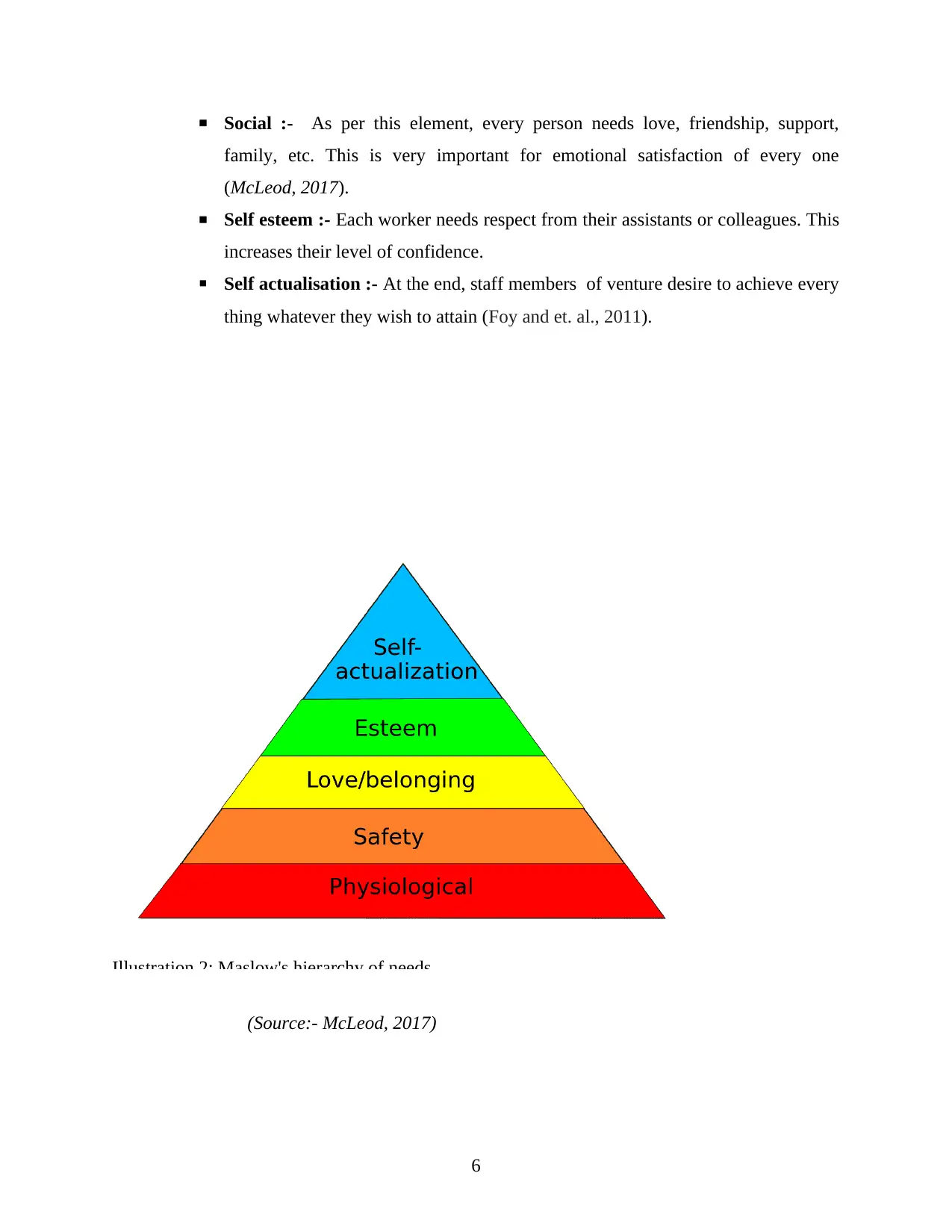
▪ Social :- As per this element, every person needs love, friendship, support,
family, etc. This is very important for emotional satisfaction of every one
(McLeod, 2017).
▪ Self esteem :- Each worker needs respect from their assistants or colleagues. This
increases their level of confidence.
▪ Self actualisation :- At the end, staff members of venture desire to achieve every
thing whatever they wish to attain (Foy and et. al., 2011).
Illustration 2: Maslow's hierarchy of needs
(Source:- McLeod, 2017)
6
family, etc. This is very important for emotional satisfaction of every one
(McLeod, 2017).
▪ Self esteem :- Each worker needs respect from their assistants or colleagues. This
increases their level of confidence.
▪ Self actualisation :- At the end, staff members of venture desire to achieve every
thing whatever they wish to attain (Foy and et. al., 2011).
Illustration 2: Maslow's hierarchy of needs
(Source:- McLeod, 2017)
6
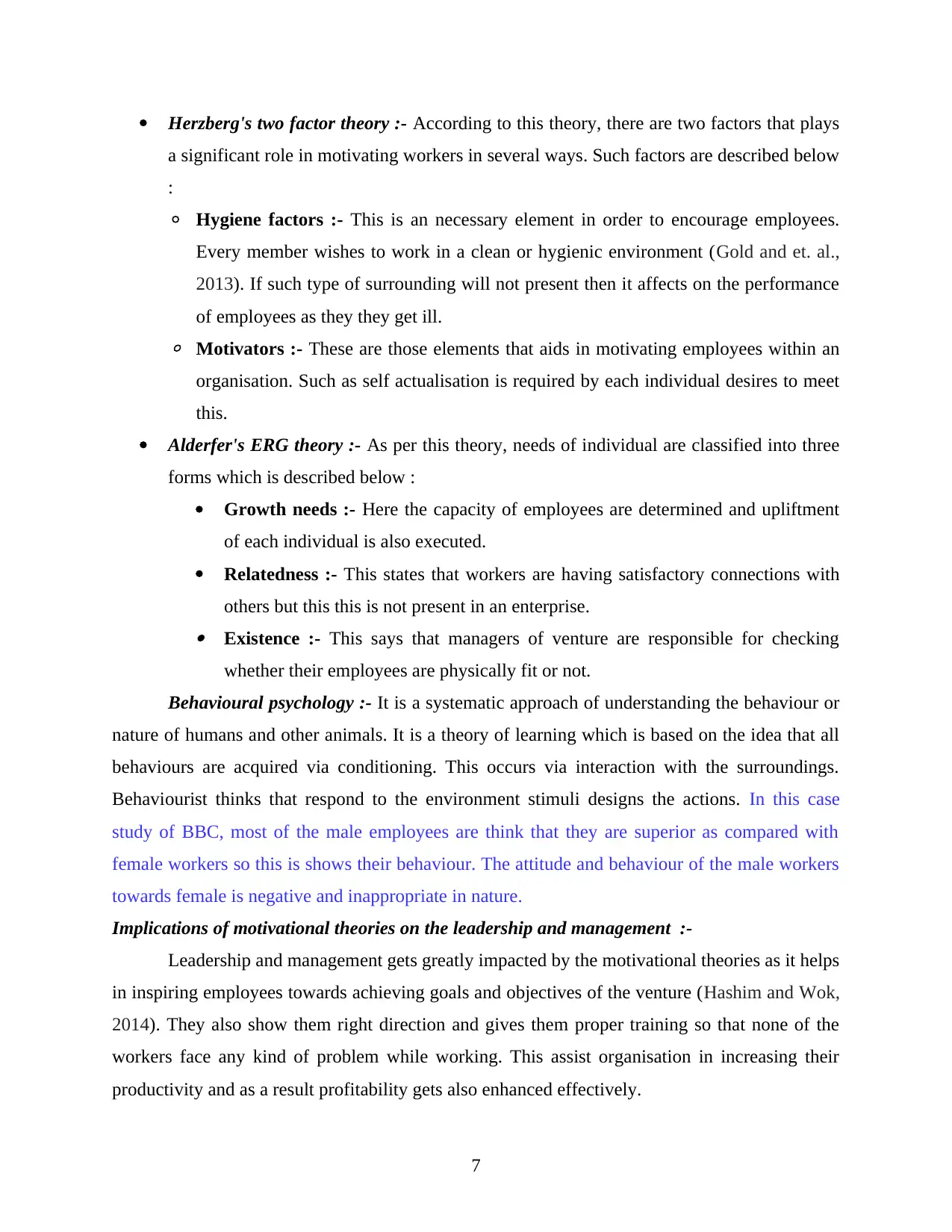
Herzberg's two factor theory :- According to this theory, there are two factors that plays
a significant role in motivating workers in several ways. Such factors are described below
:
◦ Hygiene factors :- This is an necessary element in order to encourage employees.
Every member wishes to work in a clean or hygienic environment (Gold and et. al.,
2013). If such type of surrounding will not present then it affects on the performance
of employees as they they get ill.
◦ Motivators :- These are those elements that aids in motivating employees within an
organisation. Such as self actualisation is required by each individual desires to meet
this.
Alderfer's ERG theory :- As per this theory, needs of individual are classified into three
forms which is described below :
Growth needs :- Here the capacity of employees are determined and upliftment
of each individual is also executed.
Relatedness :- This states that workers are having satisfactory connections with
others but this this is not present in an enterprise.
Existence :- This says that managers of venture are responsible for checking
whether their employees are physically fit or not.
Behavioural psychology :- It is a systematic approach of understanding the behaviour or
nature of humans and other animals. It is a theory of learning which is based on the idea that all
behaviours are acquired via conditioning. This occurs via interaction with the surroundings.
Behaviourist thinks that respond to the environment stimuli designs the actions. In this case
study of BBC, most of the male employees are think that they are superior as compared with
female workers so this is shows their behaviour. The attitude and behaviour of the male workers
towards female is negative and inappropriate in nature.
Implications of motivational theories on the leadership and management :-
Leadership and management gets greatly impacted by the motivational theories as it helps
in inspiring employees towards achieving goals and objectives of the venture (Hashim and Wok,
2014). They also show them right direction and gives them proper training so that none of the
workers face any kind of problem while working. This assist organisation in increasing their
productivity and as a result profitability gets also enhanced effectively.
7
a significant role in motivating workers in several ways. Such factors are described below
:
◦ Hygiene factors :- This is an necessary element in order to encourage employees.
Every member wishes to work in a clean or hygienic environment (Gold and et. al.,
2013). If such type of surrounding will not present then it affects on the performance
of employees as they they get ill.
◦ Motivators :- These are those elements that aids in motivating employees within an
organisation. Such as self actualisation is required by each individual desires to meet
this.
Alderfer's ERG theory :- As per this theory, needs of individual are classified into three
forms which is described below :
Growth needs :- Here the capacity of employees are determined and upliftment
of each individual is also executed.
Relatedness :- This states that workers are having satisfactory connections with
others but this this is not present in an enterprise.
Existence :- This says that managers of venture are responsible for checking
whether their employees are physically fit or not.
Behavioural psychology :- It is a systematic approach of understanding the behaviour or
nature of humans and other animals. It is a theory of learning which is based on the idea that all
behaviours are acquired via conditioning. This occurs via interaction with the surroundings.
Behaviourist thinks that respond to the environment stimuli designs the actions. In this case
study of BBC, most of the male employees are think that they are superior as compared with
female workers so this is shows their behaviour. The attitude and behaviour of the male workers
towards female is negative and inappropriate in nature.
Implications of motivational theories on the leadership and management :-
Leadership and management gets greatly impacted by the motivational theories as it helps
in inspiring employees towards achieving goals and objectives of the venture (Hashim and Wok,
2014). They also show them right direction and gives them proper training so that none of the
workers face any kind of problem while working. This assist organisation in increasing their
productivity and as a result profitability gets also enhanced effectively.
7
⊘ This is a preview!⊘
Do you want full access?
Subscribe today to unlock all pages.

Trusted by 1+ million students worldwide
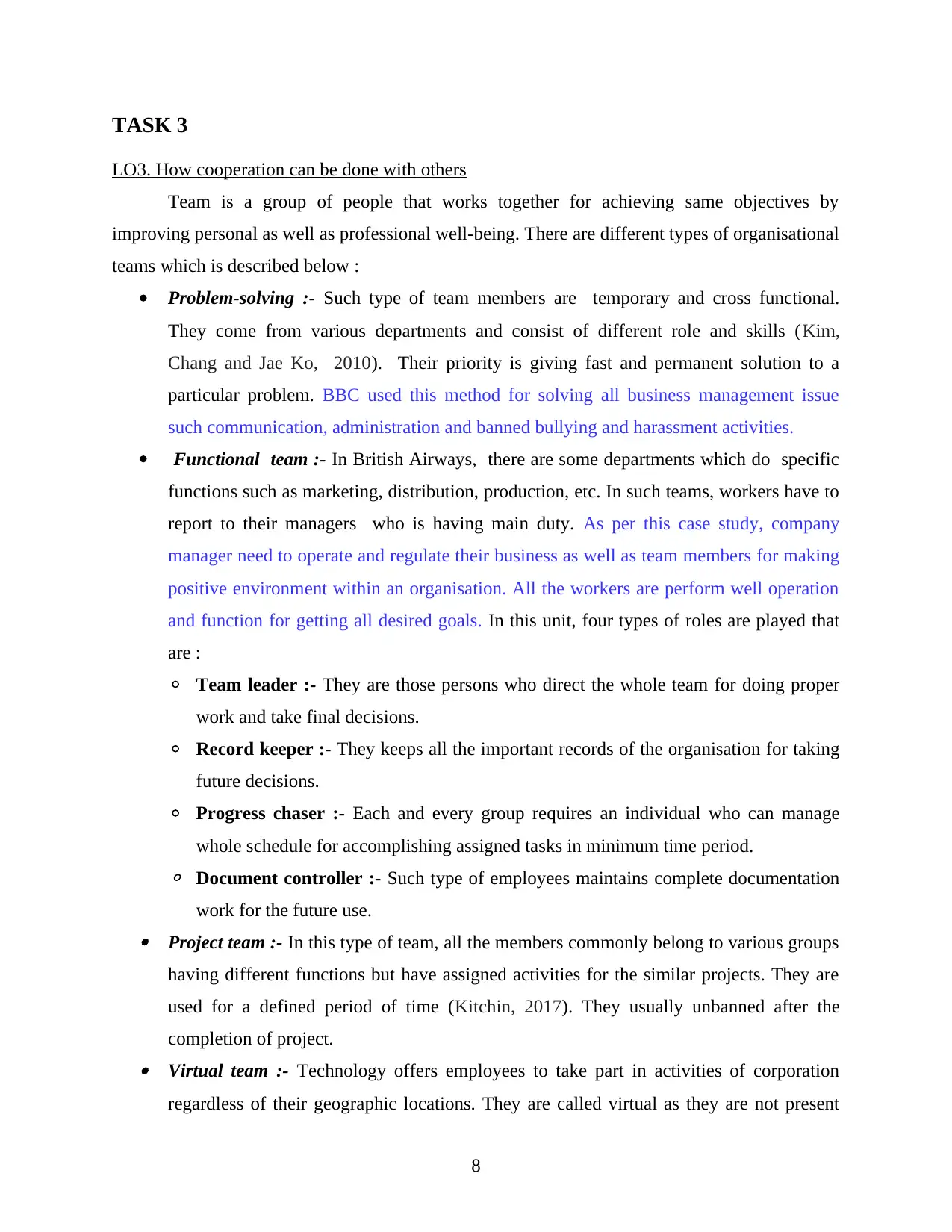
TASK 3
LO3. How cooperation can be done with others
Team is a group of people that works together for achieving same objectives by
improving personal as well as professional well-being. There are different types of organisational
teams which is described below :
Problem-solving :- Such type of team members are temporary and cross functional.
They come from various departments and consist of different role and skills (Kim,
Chang and Jae Ko, 2010). Their priority is giving fast and permanent solution to a
particular problem. BBC used this method for solving all business management issue
such communication, administration and banned bullying and harassment activities.
Functional team :- In British Airways, there are some departments which do specific
functions such as marketing, distribution, production, etc. In such teams, workers have to
report to their managers who is having main duty. As per this case study, company
manager need to operate and regulate their business as well as team members for making
positive environment within an organisation. All the workers are perform well operation
and function for getting all desired goals. In this unit, four types of roles are played that
are :
◦ Team leader :- They are those persons who direct the whole team for doing proper
work and take final decisions.
◦ Record keeper :- They keeps all the important records of the organisation for taking
future decisions.
◦ Progress chaser :- Each and every group requires an individual who can manage
whole schedule for accomplishing assigned tasks in minimum time period.
◦ Document controller :- Such type of employees maintains complete documentation
work for the future use. Project team :- In this type of team, all the members commonly belong to various groups
having different functions but have assigned activities for the similar projects. They are
used for a defined period of time (Kitchin, 2017). They usually unbanned after the
completion of project. Virtual team :- Technology offers employees to take part in activities of corporation
regardless of their geographic locations. They are called virtual as they are not present
8
LO3. How cooperation can be done with others
Team is a group of people that works together for achieving same objectives by
improving personal as well as professional well-being. There are different types of organisational
teams which is described below :
Problem-solving :- Such type of team members are temporary and cross functional.
They come from various departments and consist of different role and skills (Kim,
Chang and Jae Ko, 2010). Their priority is giving fast and permanent solution to a
particular problem. BBC used this method for solving all business management issue
such communication, administration and banned bullying and harassment activities.
Functional team :- In British Airways, there are some departments which do specific
functions such as marketing, distribution, production, etc. In such teams, workers have to
report to their managers who is having main duty. As per this case study, company
manager need to operate and regulate their business as well as team members for making
positive environment within an organisation. All the workers are perform well operation
and function for getting all desired goals. In this unit, four types of roles are played that
are :
◦ Team leader :- They are those persons who direct the whole team for doing proper
work and take final decisions.
◦ Record keeper :- They keeps all the important records of the organisation for taking
future decisions.
◦ Progress chaser :- Each and every group requires an individual who can manage
whole schedule for accomplishing assigned tasks in minimum time period.
◦ Document controller :- Such type of employees maintains complete documentation
work for the future use. Project team :- In this type of team, all the members commonly belong to various groups
having different functions but have assigned activities for the similar projects. They are
used for a defined period of time (Kitchin, 2017). They usually unbanned after the
completion of project. Virtual team :- Technology offers employees to take part in activities of corporation
regardless of their geographic locations. They are called virtual as they are not present
8
Paraphrase This Document
Need a fresh take? Get an instant paraphrase of this document with our AI Paraphraser
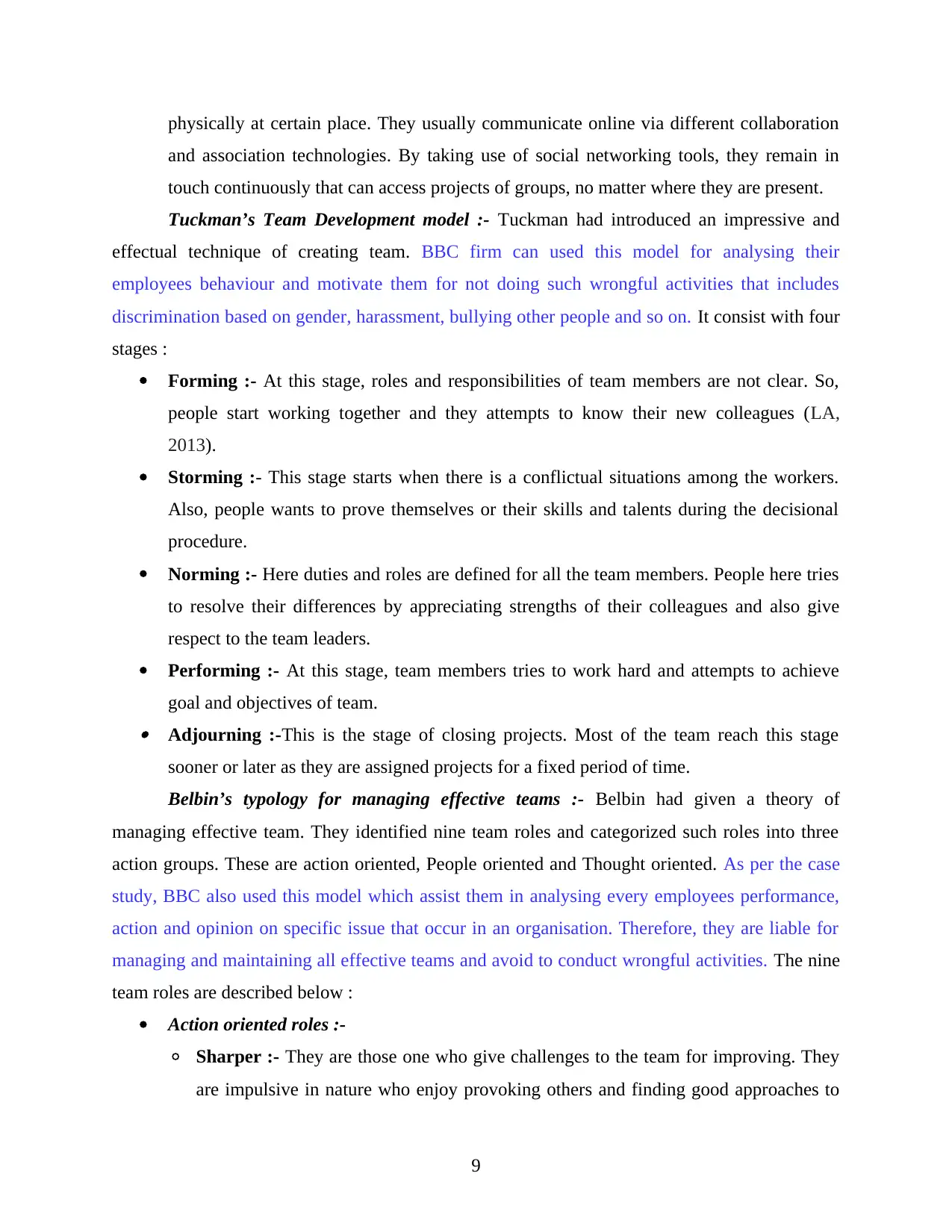
physically at certain place. They usually communicate online via different collaboration
and association technologies. By taking use of social networking tools, they remain in
touch continuously that can access projects of groups, no matter where they are present.
Tuckman’s Team Development model :- Tuckman had introduced an impressive and
effectual technique of creating team. BBC firm can used this model for analysing their
employees behaviour and motivate them for not doing such wrongful activities that includes
discrimination based on gender, harassment, bullying other people and so on. It consist with four
stages :
Forming :- At this stage, roles and responsibilities of team members are not clear. So,
people start working together and they attempts to know their new colleagues (LA,
2013).
Storming :- This stage starts when there is a conflictual situations among the workers.
Also, people wants to prove themselves or their skills and talents during the decisional
procedure.
Norming :- Here duties and roles are defined for all the team members. People here tries
to resolve their differences by appreciating strengths of their colleagues and also give
respect to the team leaders.
Performing :- At this stage, team members tries to work hard and attempts to achieve
goal and objectives of team. Adjourning :-This is the stage of closing projects. Most of the team reach this stage
sooner or later as they are assigned projects for a fixed period of time.
Belbin’s typology for managing effective teams :- Belbin had given a theory of
managing effective team. They identified nine team roles and categorized such roles into three
action groups. These are action oriented, People oriented and Thought oriented. As per the case
study, BBC also used this model which assist them in analysing every employees performance,
action and opinion on specific issue that occur in an organisation. Therefore, they are liable for
managing and maintaining all effective teams and avoid to conduct wrongful activities. The nine
team roles are described below :
Action oriented roles :-
◦ Sharper :- They are those one who give challenges to the team for improving. They
are impulsive in nature who enjoy provoking others and finding good approaches to
9
and association technologies. By taking use of social networking tools, they remain in
touch continuously that can access projects of groups, no matter where they are present.
Tuckman’s Team Development model :- Tuckman had introduced an impressive and
effectual technique of creating team. BBC firm can used this model for analysing their
employees behaviour and motivate them for not doing such wrongful activities that includes
discrimination based on gender, harassment, bullying other people and so on. It consist with four
stages :
Forming :- At this stage, roles and responsibilities of team members are not clear. So,
people start working together and they attempts to know their new colleagues (LA,
2013).
Storming :- This stage starts when there is a conflictual situations among the workers.
Also, people wants to prove themselves or their skills and talents during the decisional
procedure.
Norming :- Here duties and roles are defined for all the team members. People here tries
to resolve their differences by appreciating strengths of their colleagues and also give
respect to the team leaders.
Performing :- At this stage, team members tries to work hard and attempts to achieve
goal and objectives of team. Adjourning :-This is the stage of closing projects. Most of the team reach this stage
sooner or later as they are assigned projects for a fixed period of time.
Belbin’s typology for managing effective teams :- Belbin had given a theory of
managing effective team. They identified nine team roles and categorized such roles into three
action groups. These are action oriented, People oriented and Thought oriented. As per the case
study, BBC also used this model which assist them in analysing every employees performance,
action and opinion on specific issue that occur in an organisation. Therefore, they are liable for
managing and maintaining all effective teams and avoid to conduct wrongful activities. The nine
team roles are described below :
Action oriented roles :-
◦ Sharper :- They are those one who give challenges to the team for improving. They
are impulsive in nature who enjoy provoking others and finding good approaches to
9
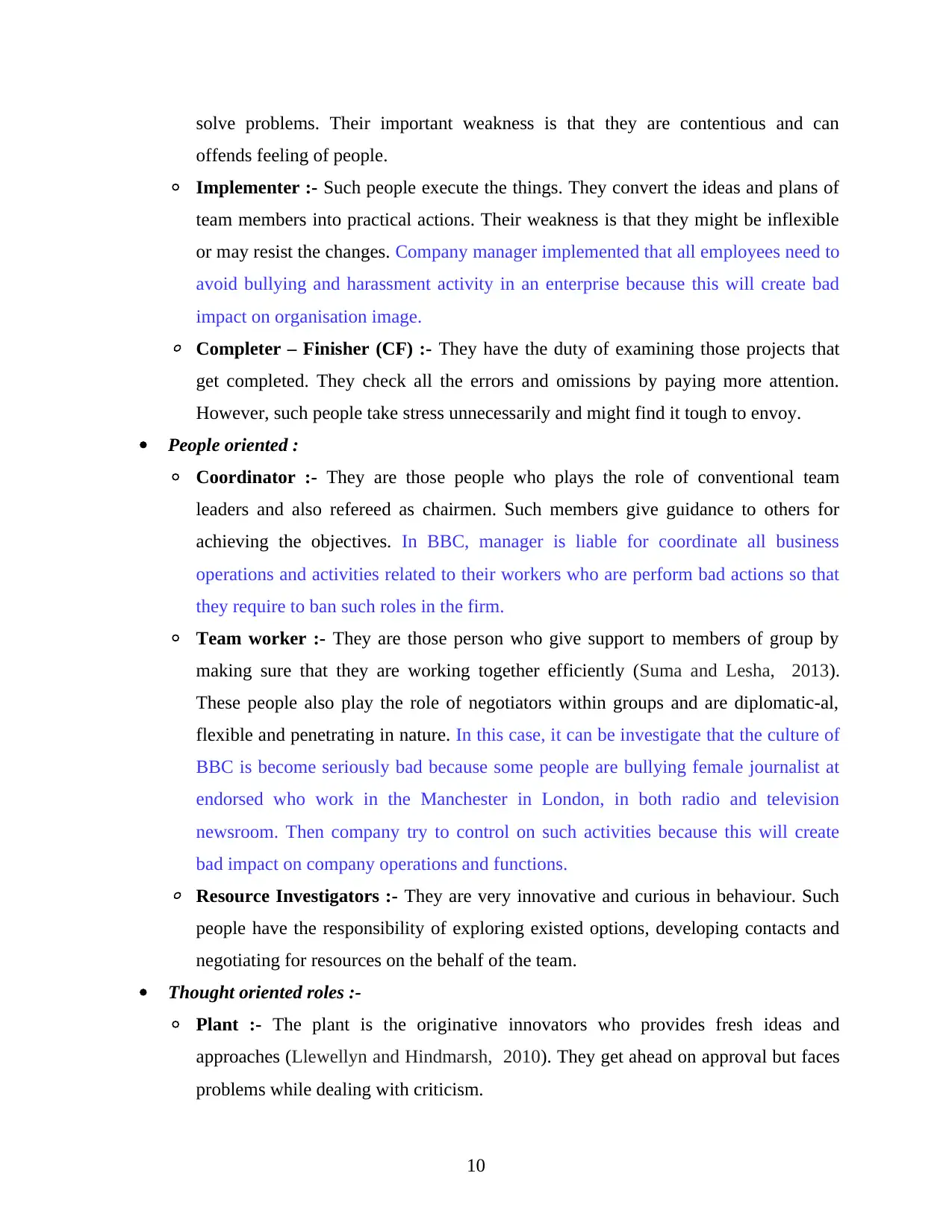
solve problems. Their important weakness is that they are contentious and can
offends feeling of people.
◦ Implementer :- Such people execute the things. They convert the ideas and plans of
team members into practical actions. Their weakness is that they might be inflexible
or may resist the changes. Company manager implemented that all employees need to
avoid bullying and harassment activity in an enterprise because this will create bad
impact on organisation image.
◦ Completer – Finisher (CF) :- They have the duty of examining those projects that
get completed. They check all the errors and omissions by paying more attention.
However, such people take stress unnecessarily and might find it tough to envoy.
People oriented :
◦ Coordinator :- They are those people who plays the role of conventional team
leaders and also refereed as chairmen. Such members give guidance to others for
achieving the objectives. In BBC, manager is liable for coordinate all business
operations and activities related to their workers who are perform bad actions so that
they require to ban such roles in the firm.
◦ Team worker :- They are those person who give support to members of group by
making sure that they are working together efficiently (Suma and Lesha, 2013).
These people also play the role of negotiators within groups and are diplomatic-al,
flexible and penetrating in nature. In this case, it can be investigate that the culture of
BBC is become seriously bad because some people are bullying female journalist at
endorsed who work in the Manchester in London, in both radio and television
newsroom. Then company try to control on such activities because this will create
bad impact on company operations and functions.
◦ Resource Investigators :- They are very innovative and curious in behaviour. Such
people have the responsibility of exploring existed options, developing contacts and
negotiating for resources on the behalf of the team.
Thought oriented roles :-
◦ Plant :- The plant is the originative innovators who provides fresh ideas and
approaches (Llewellyn and Hindmarsh, 2010). They get ahead on approval but faces
problems while dealing with criticism.
10
offends feeling of people.
◦ Implementer :- Such people execute the things. They convert the ideas and plans of
team members into practical actions. Their weakness is that they might be inflexible
or may resist the changes. Company manager implemented that all employees need to
avoid bullying and harassment activity in an enterprise because this will create bad
impact on organisation image.
◦ Completer – Finisher (CF) :- They have the duty of examining those projects that
get completed. They check all the errors and omissions by paying more attention.
However, such people take stress unnecessarily and might find it tough to envoy.
People oriented :
◦ Coordinator :- They are those people who plays the role of conventional team
leaders and also refereed as chairmen. Such members give guidance to others for
achieving the objectives. In BBC, manager is liable for coordinate all business
operations and activities related to their workers who are perform bad actions so that
they require to ban such roles in the firm.
◦ Team worker :- They are those person who give support to members of group by
making sure that they are working together efficiently (Suma and Lesha, 2013).
These people also play the role of negotiators within groups and are diplomatic-al,
flexible and penetrating in nature. In this case, it can be investigate that the culture of
BBC is become seriously bad because some people are bullying female journalist at
endorsed who work in the Manchester in London, in both radio and television
newsroom. Then company try to control on such activities because this will create
bad impact on company operations and functions.
◦ Resource Investigators :- They are very innovative and curious in behaviour. Such
people have the responsibility of exploring existed options, developing contacts and
negotiating for resources on the behalf of the team.
Thought oriented roles :-
◦ Plant :- The plant is the originative innovators who provides fresh ideas and
approaches (Llewellyn and Hindmarsh, 2010). They get ahead on approval but faces
problems while dealing with criticism.
10
⊘ This is a preview!⊘
Do you want full access?
Subscribe today to unlock all pages.

Trusted by 1+ million students worldwide
1 out of 17
Related Documents
Your All-in-One AI-Powered Toolkit for Academic Success.
+13062052269
info@desklib.com
Available 24*7 on WhatsApp / Email
![[object Object]](/_next/static/media/star-bottom.7253800d.svg)
Unlock your academic potential
Copyright © 2020–2026 A2Z Services. All Rights Reserved. Developed and managed by ZUCOL.





